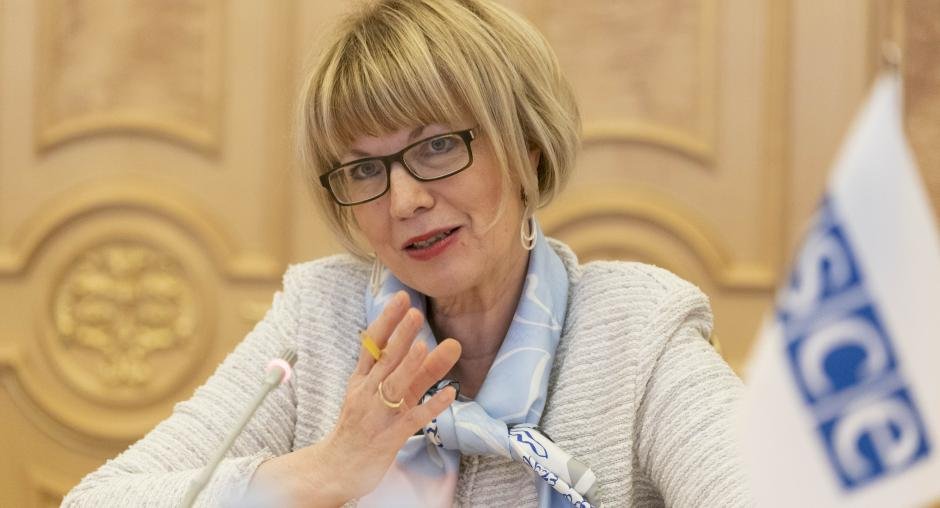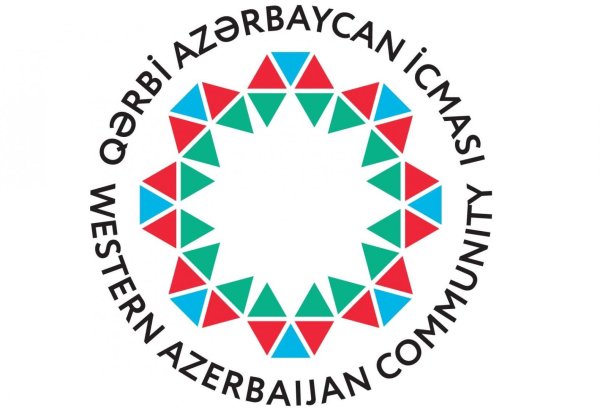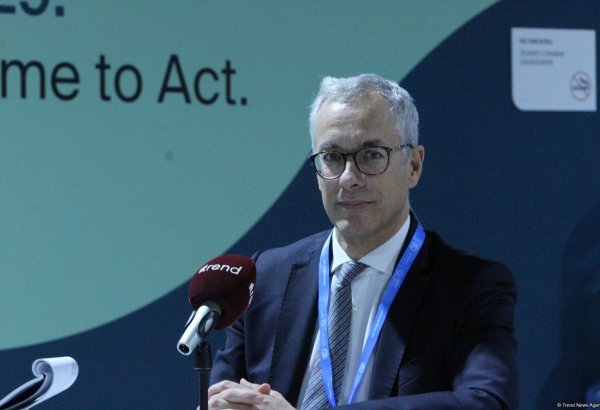BAKU, Azerbaijan, August 30. OSCE focuses on climate resilience in Central Asia through cross-border collaboration, Helga Schmid, OSCE Secretary General, told TurkicWorld in an exclusive interview.
"Earthquakes, but also droughts, landslides, and floods aggravated by climate change, are major threats in Central Asia. They disrupt economic growth, damage infrastructure, slow down progress on key economic and social indicators, and undermine efforts to maintain security and peace. That is why effective cross-border water management and cooperation on disaster risk reduction are so important to address these issues affecting the region," she said.
According to Schmid, the OSCE has unveiled a new initiative aimed at bolstering climate resilience across Central Asia, as the region faces mounting environmental threats exacerbated by climate change.
The OSCE has long championed regional cooperation in transboundary water management and security. The SecGen emphasized the importance of this cooperation: "Effective cross-border water management is essential for creating a stable and secure foundation for development. By working together, Central Asian countries can build a robust framework for addressing shared environmental challenges".
The organization’s field operations in Kazakhstan and Kyrgyzstan have supported the Intergovernmental Chu-Talas Water Commission, providing technical expertise and facilitating dialogue. "Our work with the Chu-Talas Water Commission is a prime example of how regional collaboration can lead to tangible improvements in water security and management," she noted.
In Tajikistan, the OSCE’s Programme Office in Dushanbe has been actively involved in promoting sustainable irrigation policies and wastewater treatment. "Sustainable water management is crucial for ensuring long-term environmental and economic stability," the SecGen remarked. "Our initiatives in Tajikistan aim to develop and implement policies that will benefit the region as a whole".
The new initiative will focus on enhancing resilience to environmental risks and disasters across Central Asia and the South Caucasus. Helga Schmid highlighted the goals of the initiative: "Our first pilot project in Central Asia will help us identify specific needs and develop a regional roadmap for disaster preparedness and response. This collaborative effort will bring together all five Central Asian countries to address environmental challenges in a unified manner".
The OSCE is also emphasizing the importance of gender inclusivity in decision-making on water security. "Equal participation of women in high-level decision-making processes is vital for achieving comprehensive and effective solutions," she added.
"Our comprehensive approach to security involves both enhancing preparedness and fostering regional cooperation," the SecGen said. "By improving alert systems, early warning mechanisms, and collaborative frameworks, we can better address the risks posed by environmental degradation and natural disasters".
She further noted that, in recent years, the OSCE has been actively advancing its work on energy security in Central Asia, with efforts continually expanding to address emerging challenges. Helga Schmid emphasized the importance of collaboration between governments, the private sector, and civil society to not only enhance access to energy but also to protect energy systems from evolving threats, including the growing impacts of climate change.
"Our goal is to ensure that all stakeholders work together to strengthen the resilience of energy systems against new threats," she said. "This is why we recently launched a pioneering project that provides downscaled climate modeling for the energy sector across the region until 2050. This initiative is a crucial step in helping the region adapt to the long-term impacts of climate change".
The SecGen also acknowledged the efforts of countries in transitioning to greener energy in line with their commitments to the Paris Agreement. "We are fully supporting these efforts, aiming to help countries achieve their energy transition goals in a way that’s both sustainable and inclusive," she noted. "It's essential that women and marginalized groups are actively involved in this transition, ensuring that no one is left behind".
On the topic of connectivity, the OSCE remains committed to helping stakeholders in trade and transport unlock the full potential of the region as a key market hub connecting Europe and Asia. The SecGen highlighted one of the OSCE's flagship initiatives, the 'Green Ports' Project, which assists selected ports in the Caspian and Black Seas in achieving EcoPorts certifications, aligning them with top international environmental standards.
"This is an initiative I am personally very proud of," she said. "I was pleased to hand over eco-certificates in person to the ports of Kuryk in Kazakhstan and Turkmenbashi in Turkmenistan during my visits to the region. I was equally impressed by the work done at the port of Baku. Moving forward, we plan to further strengthen the resilience of these ports against the projected impacts of climate change".
Looking ahead, the OSCE plans to expand its work on connectivity by promoting cross-border trade and transport facilitation, supporting regional and interregional economic cooperation, and establishing an interregional digital trade platform.
"We believe that enhancing collaboration to build a secure energy provision system and a trans-border trade network can significantly boost confidence and promote security in the region," the SecGen stated. "We are actively working to ensure that our initiatives deliver tangible results on the ground, benefiting millions across the region".
Schmid highlighted the OSCE’s efforts to reduce the environmental impact of ports in the Caspian and Black Sea regions, emphasizing the significant progress made in recent years. "When I visited the Port of Baku last July, I saw firsthand the difference this is making," she stated. The OSCE is leveraging advanced technologies to enable ports to monitor various environmental factors, allowing them to adapt their operations to meet ambitious sustainability goals.
Beyond port initiatives, the OSCE is also fostering broader climate cooperation across Central Asia, bringing cities like Astana, Ashgabat, and Tashkent into the fold. Schmid underscored the importance of urban areas in addressing climate challenges, given that most of the global population now resides in cities. The organization is working to develop sustainable, resilient, and innovative urban solutions, sharing knowledge and best practices across borders to ensure that Central Asia is well-prepared for the future.
The OSCE’s efforts in green ports and urban cooperation reflect a broader commitment to cross-border collaboration as a central strategy for overcoming climate-related challenges. Schmid noted, "There is simply no other way. The OSCE is doing its part to deliver for the citizens across the OSCE region."
Speaking further, Helga Schmid highlighted the critical need for cross-border cooperation to address the multifaceted challenges faced by Central Asia and the South Caucasus. "The challenges we face transcend national borders. Our solutions must therefore bridge communities, borders, and nations," she stated, emphasizing that no single country can tackle issues such as climate change, ongoing conflicts, or regional instability alone.
Reflecting on her tenure, Helga Schmid underscored the OSCE's commitment to fostering regional collaboration. "Bringing together states to address shared security issues is at the heart of the OSCE’s mission. This is particularly relevant for Central Asia and the South Caucasus," she noted. The SecGen praised the OSCE’s efforts in promoting and often initiating regional cooperation to address common challenges.
One notable achievement mentioned by the SecGen was the launch of a regional environmental dialogue format at the OSCE High-Level Conference on Climate Change, held in Vienna on July 7, 2023. This new ‘5+1 format’ has proven effective in strengthening regional partnerships, with subsequent meetings involving Foreign Affairs Ministers in 2023 and Environment Ministers in March 2024.
Emphasizing the importance of inclusivity, Schmid pointed out that safety and security cannot be achieved without involving diverse perspectives. "The OSCE is dedicated to providing platforms for young people and women to contribute to regional security," she said. Through model conferences, summer schools, and initiatives like the Young Women for Peace Initiative for Central Asia, the OSCE is working to empower young women and men in peacebuilding and conflict resolution.
Helga Schmid expressed pride in these efforts and reaffirmed the OSCE’s commitment to supporting a sustainable and peaceful future for the region. "Our work in Central Asia and the South Caucasus is ongoing, and we remain focused on building a more secure and cooperative regional environment," she concluded.






















